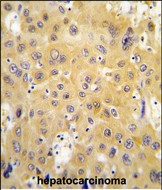

| WB | 咨询技术 | Human,Mouse,Rat |
| IF | 咨询技术 | Human,Mouse,Rat |
| IHC | 1/100-1/500 | Human,Mouse,Rat |
| ICC | 技术咨询 | Human,Mouse,Rat |
| FCM | 咨询技术 | Human,Mouse,Rat |
| Elisa | 咨询技术 | Human,Mouse,Rat |
| Aliases | Thymidine phosphorylase, TP, Gliostatin, Platelet-derived endothelial cell growth factor, PD-ECGF, TdRPase, TYMP, ECGF1 |
| Entrez GeneID | 1890 |
| WB Predicted band size | 50.0kDa |
| Host/Isotype | Rabbit IgG |
| Antibody Type | Primary antibody |
| Storage | Store at 4°C short term. Aliquot and store at -20°C long term. Avoid freeze/thaw cycles. |
| Species Reactivity | Human |
| Immunogen | This ECGF1 antibody is generated from rabbits immunized with a KLH conjugated synthetic peptide between 318-345 amino acids from the Central region of human ECGF1. |
| Formulation | Purified antibody in PBS with 0.05% sodium azide. |
+ +
以下是关于ECGF1(Endothelial Cell Growth Factor 1.或称Thymidine Phosphorylase)抗体的3篇文献及其摘要概括:
---
1. **文献名称**:*Thymidine phosphorylase expression in human colorectal cancer: role in tumor angiogenesis and prognosis*
**作者**:Takebayashi Y. et al.
**摘要**:该研究通过免疫组化方法,利用ECGF1/TP特异性抗体分析结直肠癌组织中ECGF1的表达水平,发现其高表达与肿瘤血管生成增加及患者预后不良相关,提示ECGF1可能作为预后标志物。
2. **文献名称**:*Platelet-derived endothelial cell growth factor/thymidine phosphorylase: a novel therapeutic target for cancer*
**作者**:Fox S.B. et al.
**摘要**:文章综述了ECGF1/TP在肿瘤微环境中的双重作用(促血管生成和调节化疗敏感性),并讨论了针对该蛋白的抗体在靶向治疗及诊断中的应用潜力。
3. **文献名称**:*Immunohistochemical detection of thymidine phosphorylase in glioblastoma multiforme: association with tumor grade and survival*
**作者**:Akiyama Y. et al.
**摘要**:研究使用ECGF1抗体检测胶质母细胞瘤中TP的表达,发现其表达水平与肿瘤恶性程度呈正相关,且高表达患者生存期较短,表明其在神经肿瘤中的临床意义。
---
**备注**:ECGF1与胸苷磷酸化酶(TP)为同一蛋白,相关研究多集中于其在肿瘤血管生成、化疗耐药性及预后评估中的作用。上述文献均通过特异性抗体进行蛋白定位或功能研究。
ECGF1 (Endothelial Cell Growth Factor 1), also known as thymidine phosphorylase (TYMP), is a platelet-derived enzyme involved in angiogenesis, cell migration, and nucleotide metabolism. It catalyzes the conversion of thymidine to thymine and 2-deoxy-D-ribose-1-phosphate, generating bioactive metabolites that promote endothelial cell proliferation and chemotaxis. ECGF1 is expressed in platelets, macrophages, and certain tumor cells, where it contributes to tumor neovascularization and progression. Its overexpression in cancers (e.g., colorectal, breast) correlates with poor prognosis, making it a potential therapeutic target.
ECGF1 antibodies are tools used to detect and quantify ECGF1 expression in research and diagnostics. They are employed in techniques like immunohistochemistry (IHC), Western blotting, and ELISA to study ECGF1's role in tumor biology, inflammatory diseases, and cardiovascular disorders. These antibodies aid in exploring ECGF1's dual role as both a pro-angiogenic factor and a modulator of chemotherapeutic drug sensitivity. Monoclonal and polyclonal variants are available, often validated for specificity against human, mouse, or rat ECGF1. Recent studies also investigate ECGF1's immunomodulatory functions, linking it to macrophage polarization and tumor microenvironment regulation. Its clinical relevance extends to biomarker research for anticancer therapies and vascular disease management.
×